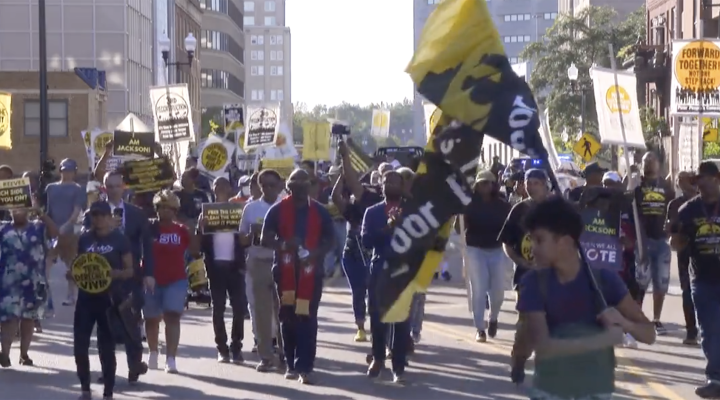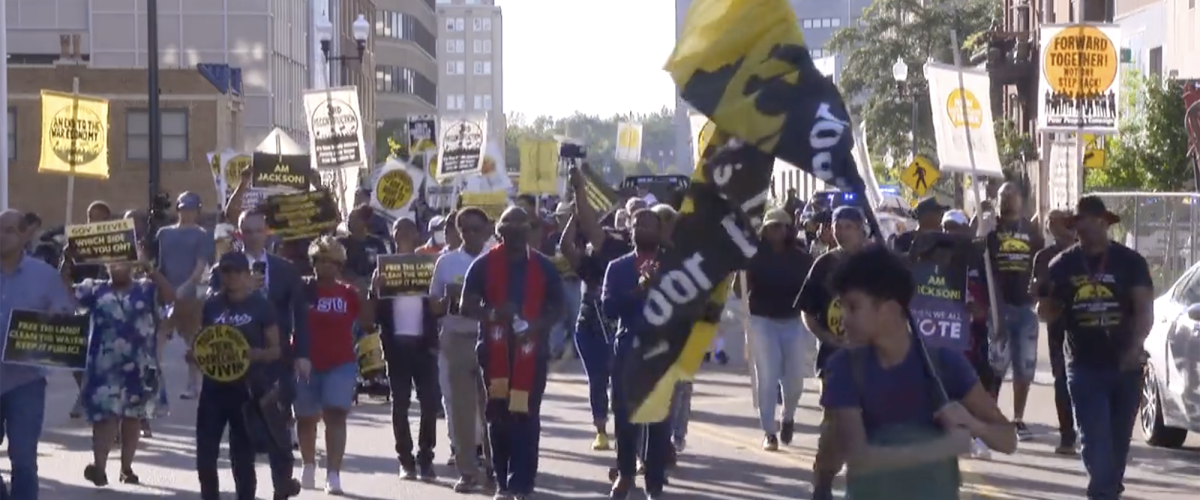Bishop William J. Barber brought his Poor People’s Campaign and Moral Mondays to Jackson, Miss., Sept. 26 to protest a notoriously neglected and broken water system that has generated hundreds of boil advisories in the last two years alone and recently failed altogether.
But the big news, Barber said during the march and rally at the statehouse, is that the protests will continue every two weeks. “Moral Mondays are never about one-day events. Moral Mondays are always about beginning a protest and a time that will not cease until the change comes.”
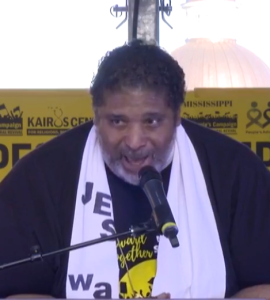 The Moral Mondays movement began in North Carolina in 2013 and brought Barber to national prominence as a leader and spokesman for progressive Christianity and social justice.
The Moral Mondays movement began in North Carolina in 2013 and brought Barber to national prominence as a leader and spokesman for progressive Christianity and social justice.
Barber repeatedly emphasized that the Jackson campaign, and opposition to the injustices that birthed it, have the backing of Scripture: “The first Moral Monday was when Jesus went public and served notice on a governor named Pilate and a king named Herod, and he went into the temple and overturned the tables. That was the first Moral Monday.”
The campaign’s arrival in Jackson was sparked by the latest failure of the city’s water infrastructure, which began with almost a week of boil advisories before a complete breakdown in late August. The shutdown left about 180,000 residents without running water for several days and forced the closure of schools as many residents turned to bottled water, if they could afford it.
Since then, reports have surfaced about inadequate staffing and years of delayed repairs to the system that could cost as much as $1 billion to address. Earlier this month, the U.S. Environmental Protection Agency announced it will investigate Jackson’s water system, and the U.S. Department of Justice said it is considering legal action.
The situation has created a rift between Jackson Mayor Chokwe Antar Lumumba and Mississippi Gov. Tate Reeves, who has blamed the city for failing to develop a plan to repair the system.
But Barber didn’t buy the governor’s claim: “It’s immoral for the governor and members of the state legislature to … say that Jackson doesn’t have a plan when Jackson has had a plan. You just haven’t had the damn consciousness to make the plan happen.”
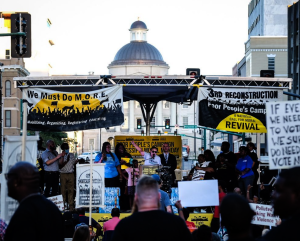 Jackson residents who joined Barber on stage also pointed some of their remarks at Reeves. Most also said the city’s water challenges disproportionately affect African Americans, the poor, physically impaired, children and pregnant women.
Jackson residents who joined Barber on stage also pointed some of their remarks at Reeves. Most also said the city’s water challenges disproportionately affect African Americans, the poor, physically impaired, children and pregnant women.
“It’s a constant struggle each and every day,” Deneka Samuel said about having to use unhealthy water to bathe and cook. “I did not choose to be Black. I did not choose to have no water. But I will fight for clean water. I will not take it anymore.”
While many residents have been purchasing bottled water at stores, others have not been able to do so, protester Scott Crawford explained. “For many older adults and transit riders, imagine carrying water a half mile to your house from the nearest bus stop.”
Crawford said he’s involved in the Moral Mondays effort because the city’s water issues persist. “This crisis is not over. We still have a fragile water system. One hard freeze is all it will take to break our water system again.”
Federal and state leaders should take their cue from Jackson’s residents, rally participant Chris Ellis said. “I have seen the people of Jackson rise up to care for each other, to fill in potholes on our streets and distribute water to our own.”
Gov. Reeves’ recent comments that one solution may be to privatize Jackson’s water infrastructure must be opposed, Ellis said. “They are trying to steal our money and our future, and I’m not going to stand for that.”
Reeves and the state legislature should consult their Bibles before considering selling off the city’s water system, Barber added. “If the word ‘privatization’ comes out of your mouth, that is sinful. To take from people the water and control of their own city, and you ruin the city, that is sinful.”
The right to have clean water in Jackson will not be forgotten as it has been so many times before now that protests will be held every two weeks, Barber said, with the next rally planned for Oct. 10.
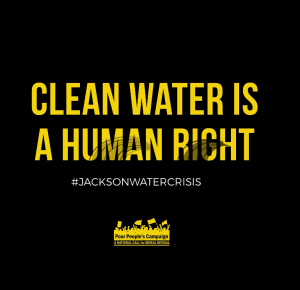 “Moral Monday in Mississippi is not about a photo op,” he said. “It is a deeply rooted, nonviolent, multi-faceted, multi-racial, multi-faith political strategy to challenge oppressive systems that hurt Black people, brown people, Asian people, Latino people, indigenous people and white people. In other words, it hurts all of God’s creation. … There will not be an outcry for a moment, and then we go home. We’re not going to allow it to slip out of the media.”
“Moral Monday in Mississippi is not about a photo op,” he said. “It is a deeply rooted, nonviolent, multi-faceted, multi-racial, multi-faith political strategy to challenge oppressive systems that hurt Black people, brown people, Asian people, Latino people, indigenous people and white people. In other words, it hurts all of God’s creation. … There will not be an outcry for a moment, and then we go home. We’re not going to allow it to slip out of the media.”
But he also challenged those who would be involved in the movement. “Moral Monday should only be engaged when people are ready to go the distance in protest. … You should only say you are going to do Moral Mondays when you are sick and tired of being sick and tired.”
Clergy and activists also must rise up to lend their voices consistently to the effort, he said. “All our religious traditions say you’re supposed to stand up for the poor. All our religious traditions say you’re supposed to love people. All our religious traditions say you’re supposed to speak truth.”
Barber said he knows many are ready to join the campaign. “I believe some of y’all are ready for nonviolent, direct action because you are tired of drinking poison. You’re tired of your members washing their babies in poison. And there comes a time when you must show people how tired you are.”
Related articles:
In Jackson, Miss., the lack of water flows into conversation about God, politics and public trust | Opinion by Jason Coker
If you think the Jackson water crisis is just about Mississippi, you’re all dried up | Opinion by Wendell Griffen
An entire city with no water doesn’t fit the playbook for disaster relief organizations

